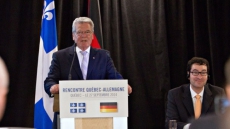VICTORIA - Liquefied natural gas is poised to get top billing during the British Columbia fall legislative session, but the Opposition and environmental groups have plans to shift the focus.
Politicians return to the legislature Monday for a session scheduled to last until Nov. 27.
Lt.-Gov. Judith Guichon will read a throne speech that lays out the government's agenda.
Finance Minister Mike de Jong said the Liberal government plans to introduce two separate pieces of legislation that focus on LNG, one covering taxes, the other emissions reporting.
He introduced a proposed LNG Income Tax with last February's budget, and government and the oil and gas industry have been in consultations ever since.
Opposition New Democrat house leader Mike Farnworth said the government has been fixated on LNG to the point where other issues important to British Columbians, including jobs, education and health care have been ignored.
"LNG has been the only thing this government has focused on at the expense of everything else," he said. "They have made a raft of promises about what LNG is going to do for the province and we have yet to see anything. We're going to have a real opportunity to go after this government on its economic focus on LNG."
NDP Leader John Horgan said the Opposition will take a four-pillar approach to LNG development, which includes jobs for B.C. residents, involvement of First Nations, benefits to communities and the world's greenest LNG.
De Jong said the first tier of the tax would be 1.5 per cent at the start of production, and the second tier could rise to seven per cent once the plant is running and capital costs have been deducted.
Specific figures will be introduced in the session, but de Jong indicated last spring that seven per cent was at the top of the tax range.
"There's certainly been discussion around the overall cost structure," he said. "There has been an unprecedented level of consultation and discussion."
The government wants to post a tax rate that convinces energy firms that they can invest in B.C. and remain competitive in the world LNG markets, but it's also mindful that British Columbians expect a fair return from the resource, de Jong said.
Premier Christy Clark bills the development of an LNG export industry as having the potential to generate a trillion-dollar economic opportunity that could create up to 100,000 jobs.
Several major LNG companies — including Malaysian energy giant Petronas, which is part of a multi-billion-dollar LNG proposal near Prince Rupert — have said they need to see the government’s taxation plan before committing.
Clark met with Petronas chief executive officer Shamsul Abbas last week, with officials describing the meeting as "cordial."
Deloitte's Calgary-based oil and gas industry analyst Geoff Hill said the industry is eagerly awaiting the LNG announcement with a hope for a tax that is low, but also a tax that brings certainty to the cost of doing business.
"It's just the level of the tax and how it's administered, those things are really important to get figured out," Hill said. "Canada isn't automatically, necessarily, the most competitive globally, so the tax has to be fair and competitive."
De Jong said part of the LNG tax will be legislation governing emissions controls connected to the LNG industry. He would not elaborate on the legislation, but the Environment Ministry issued a statement saying it will make B.C.'s LNG the cleanest in the world.
The Pembina Institute said the emissions controls introduced by the government will indicate how green the industry actually is when it comes to controlling carbon emissions from the LNG industry.
Pembina climate expert Matt Horne said carbon pollution occurs at every facet of the LNG production process from the terminals, pipelines and gas-field extractions.
B.C.'s legislated greenhouse gas reduction targets law seeks cut emissions by one-third by 2020.
Horne said the Pembina Institute calculates B.C.'s carbon tax will have to be set at $150 a tonne in 2020 to help meet the reduction targets. The current carbon tax is at $30 a tonne.




